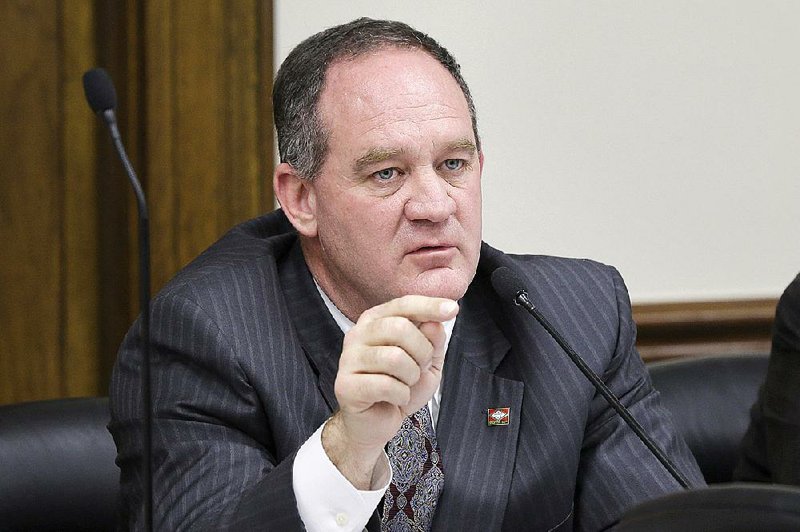Legislation that would trim the size of the Arkansas Academic Challenge Scholarship for future recipients in their first year of college and change the eligibility requirements advanced Wednesday through the Senate Education Committee.
Sen. Jimmy Hickey, R-Texarkana, said his Senate Bill 5 is aimed at making sure the scholarship program, financed largely by the Arkansas Scholarship Lottery, doesn't run out of money as early as February of 2016.
More than 30,000 students have received the scholarships during each of the past five fiscal years.
In recent years, the Legislature has twice cut the size of the scholarships for future recipients, partly as a result of the lottery raising less than projected for the scholarships. During the past 2½ fiscal years, the lottery has experienced declining ticket sales and amounts raised for scholarships.
Starting in the 2015-2016 academic year, the Arkansas Academic Challenge Scholarship would be reduced from $2,000 to $1,000 for the freshman year at the two- and four-year colleges under the bill.
The scholarship would be increased from $3,000 to $4,000 for the sophomore year at the four-year colleges and increased from $2,000 to $3,000 for the sophomore year at the two-year colleges through the legislation.
Scholarship recipients would receive $4,000 in the junior year and $5,000 as seniors at the four-year universities.
The state spends about $10 million to $11 million a year on the scholarships for freshmen who don't retain their scholarships after the first year, said Harold Criswell, deputy director of the state Department of Higher Education.
SB5 also would change the scholarship's eligibility requirements so future high school graduates would be required to have an ACT score of at least 19 or the equivalent on a comparable college entrance exam.
Under current state law, high school graduates are required to have successfully completed the Smart Core curriculum and achieved either a high school grade point average of at least 2.5 or a minimum score of 19 on the ACT or the equivalent on a comparable exam in order to receive the scholarship.
About 1,700 of the nearly 13,000 scholarship recipients, who are recent high school graduates, wouldn't have been awarded the scholarship if SB5 had been effect for the 2014-2015 school year, said state Department of Higher Education Director Brett Powell.
Hickey said his bill would help the program avoid temporarily running out of funds for scholarships as early as February of 2016 and save the program an average of about $3.5 million each semester over three semesters.
The Legislature's other options are to "do nothing" or to increase the state general revenue to the scholarship program beyond the existing $20 million a year, he told the committee.
Doing nothing is the least desirable option because the "failure to pay a group of students could create a publicity perception situation that could affect lottery sales in a negative way," said Hickey, co-chairman of the Legislature's lottery oversight committee.
He said he also doesn't "sense an appetite" within the Legislature to increase the state's $20 million a year for the program so "I don't believe that is a viable path."
Based on lottery figures for the first seven months of fiscal 2015, he said it looks like the games will raise between $72 million and $76 million for scholarships in the year ending June 30 and "everything that points [suggest] it is going to be somewhere around $73 [million]," he said.
In August, lottery Director Bishop Woosley projected that about $78.2 million would be raised for scholarships in fiscal 2015.
The lottery started selling tickets Sept. 28, 2009.
After raising $82.7 million for scholarships in nine months in fiscal 2010, the lottery raised $94.2 million during the first full fiscal year, 2011. Proceeds for scholarships climbed to $97.5 million in 2012 but dropped to $90.3 million in 2013. In 2014, proceeds fell to $81.4 million.
Hickey said the scholarship program will have roughly $73 million from the lottery in fiscal 2015, plus the state's $20 million. The scholarships are projected to be about $102 million in fiscal 2015.
"The only way we have been able to stay solvent -- for a lack of a better word -- is because when we started the lottery we actually had a $20 million reserve account that we had put out there for timing purposes, basically operating like a line of credit which we draw in and out of," Hickey said.
Hickey said it's projected that the scholarship program wouldn't be able to meet $613,000 in scholarship obligations in February 2016 after exhausting the $20 million lottery reserve fund and could run $30 million short by February 2017.
"We're hoping by doing this -- plus y'all have allowed the lottery commission [to be abolished through Act 218] and some efficiencies that we have there -- that this will allow us just enough room to correct the situation," he said.
Act 218, which went into effect Feb. 26, also shifted control of the lottery to Republican Gov. Asa Hutchinson's administration in the state Department of Finance and Administration.
Bill Stovall, executive director of the Arkansas Community Colleges, told the Senate committee that "we recognize that this is a fund issue and that without the interest of the General Assembly to put any additional [state general revenue] dollars into it is a cash-flow issue.
"We believe that [Hickey] has done the best we can do for our institutions," said Stovall, a former House speaker and House chief of staff.
But Richard Hutchinson, representing the Arkansas Public Policy Panel, said that "we still believe that in total what this bill proposes to do is not the best policy decision that needs to be made in regard to the lottery scholarship."
The General Assembly should find enough state funds to not only keep the scholarship program but also increase scholarship sizes, he said.
The Arkansas Public Policy Panel is a statewide organization dedicated to achieving social and economic justice by organizing citizen groups around the state, according to its website.
Metro on 03/05/2015

